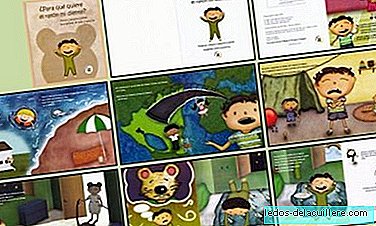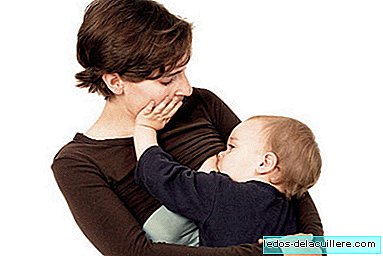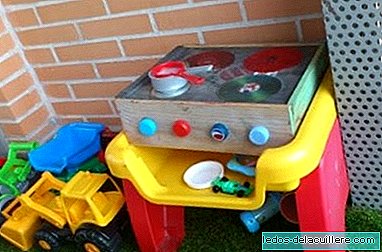
Have you ever thought about why we ask our children to be educated with others, not to scream and we tell them screaming because they ignore us?
Tania García, pedagogue, family advisor and founder of the international school Edurespeta, she has a clear response and defends educating children and adolescents without shouting or punishment, with common sense, connection, love, tolerance and coherence.
States that The only and best way to prevent children from being aggressive, violent, disrespectful, or intolerant, both in their present and in their future, is to educate them and, therefore, treat them, with respect.
We must lead by example
Tania García explains in her latest book, "Educate without losing your temper" that it is impossible to think (in addition to being incoherent) that, if we treat children through screams, punishments, judgments, criticisms, adultism, authoritarianism, demands, zero empathy towards their emotional processes, physical and verbal violence ..., they will ignore this when it comes to relating.
We are for our children the mirrors where they look, the example to follow."That is, if we shout, we teach how to shout; if we make value judgments, we teach how to make value judgments; if we demand, we teach how to demand; if we give 'cheeks', we teach how to hit."
Misinformation about child aggression
In order to prevent children from being aggressive or to help them stop being so, it is important that we know what child aggression really is, since, according to the family counselor, there is a great misinformation that harms, in the first instance, the children.
"Everything children do when they express their emotions is a source of criticism on the part of adults."If they shout when they get angry, frustrated or feel, we put our hands to our heads and do not understand.
If they cry and kick, we think they are teasing us or have little tolerance for frustration.
If they bite or kick the air, we definitely believe they have a social, emotional and / or emotional problem and need outside help to learn to 'calm down'.
This is explained by Tania García, who clarifies that "All these issues are normal and natural for children."
"They are in full development and evolution, their brain is purely emotional, and they do not move by reason or logic. Their brain is occupied at that moment by their emotion, by what they feel and by how they feel it."
They are not aggressive, it is simply their way of expressing their emotions. And our role is to know how to be. The better we know how to be, from calm and common sense, the more we will understand them and the more they will understand.
The writer explains that if we do not accompany them, their emotions may "They become a cystic problem that later becomes episodes of uncontrolled and more violent expression" and ensures that being by your side is how we boost your self-esteem and self-confidence.
How do parents have to act in the face of aggression?

According to the expert we must, among other things:
Don't alarm us
Know your emotional processes and ours
Have a deep respect for their processes and rhythms
Empathize and understand their motives, even if we don't share them
Hold and accompany emotionally
Listen and attend
Let them express their emotions in all their integrity and vastness.
If while expressing them aggravate or self-aggrandize, we will stop this expression, but not abruptly or violently, because then we will teach you that it is okay to express yourself abruptly or hurting when expressing emotions. As Tania García advises in 'Educate without losing your temper', you have to:
Understand that it is not a problem but an emotion expressed that way.
Take into account the age of our sons and daughters and accompany emotions according to their age and understanding.
 In Babies and more 'Emperor child syndrome' does not exist, because there are no tyrant children
In Babies and more 'Emperor child syndrome' does not exist, because there are no tyrant childrenDo not make judgments or values.
Do not lose your temper: keep calm and serene.
Do not laugh at them or disrespect them.
Work on our own frustration to not express it ourselves while they need us to overcome theirs.
Put aside what others can say and put all the attention on our child and his needs.
Do not tag or let them tag you.
Focus on our son. The other children need the accompaniment of their parents.
Give up the victim's victim "You hurt me," "It hurts." in our day to day with him. We cannot take it personally, even if it hits or insults us.
Do not give cushions or gadgets to 'download' your aggressiveness there, because with that, the only thing we achieve is that he transfers his violence from place.
From the age of four, you can talk with the boy or girl about the subject and recreate the scene with toys or drawing. Let it be explained, why he thinks he did it and how he could have solved it. Without intervening or giving advice, just listen and hug when you need it. So the next time it happens, it will have tools to solve it without aggressiveness.
And, of course, no punishment or consequences. A child cannot learn by repression or fear.
 In Babies and more Children and adolescents are less violent in countries where corporal punishment is prohibited
In Babies and more Children and adolescents are less violent in countries where corporal punishment is prohibitedThe way you express your emotions, hide something behind
They can be fears, frustrations, tiredness, nerves, stress, the response to being educated without respect (under fear, submission, shouting and punishment ...).
"Children are people and they need their educators, their parents, to attend them correctly, listen to them and take care of them", says Tania.
If we do so, little by little, with patience and taking care to know them perfectly (being aware of everything that happens in their life), they will learn to express themselves emotionally, something necessary for proper emotional health, but without harming anyone or harm themselves.
Photos | iStock
In Babies and More |

Educate without losing your nerves: Emotional guide to transform your family life (Practical book)
Today in Amazon for € 16.99











